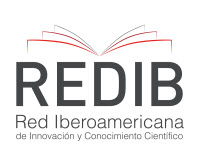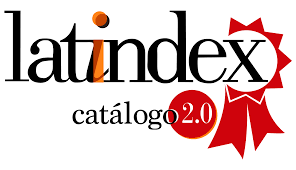
This work is licensed under a Creative Commons Attribution-NonCommercial-ShareAlike 4.0 International License.
Esta obra está bajo licencia internacional https://creativecommons.org/licenses/by-nc-sa/4.0/deed.es
La revista (y sus contenidos) emplean las licencias Creative Commons, específicamente la del tipo CC BY NC SA 4.0, la cual establece que “el beneficiario de la licencia tiene el derecho de copiar, distribuir, exhibir y representar la obra y hacer obras derivadas siempre y cuando reconozca y cite la obra de la forma especificada por el autor o el licenciante”. La licencia del tipo CC BY NC SA 4.0 contempla tres categorías,
- Atribución.
- No Comercialización de la obra.
- Compartir igual
Los lectores son libres de:
- Compartir — copiar y redistribuir el material en cualquier medio o formato
- Adaptar — remezclar, transformar y construir a partir del materialLa licenciante no puede revocar estas libertades en tanto usted siga los términos de la licencia
- Siempre y cuando se respeten y contemplen la atribución de autoría y la no comercialización del material.
Abstract
The changes introduced by the Covid-19 pandemic have generated changes in educational processes in general and in the evaluation process in particular, where the actors must resort to the use of information and communication technologies (ICT) to mediate the process of compiling the necessary evidence to measure academic performance. The objective of this research work was to identify the problems that university students perceive in the evaluation of their performance, in virtual learning environments (EVA), due to the Covid_19 Pandemic. It is becoming clear that the world was not sufficiently prepared to deal with a crisis caused by a pandemic, and both public and private organizations, have been affected. Higher education does not escape this reality, the evaluation process being the foundation of educational quality. Using a quantitative and qualitative methodology and a field research model, an online instrument (survey) was applied to a sample of 160 students (32%) from the International University of Science and Technology (UNICyT). The results obtained allow us to identify that 61% of the participants presented some change with their evaluation processes of their subjects or modules due to the crisis caused by the Covid-19 pandemic, among the factors that were indicated, highlighted by the students are Internet failures when it rains and intermittent lack of Internet. It has concluded that there are several causes that hinder the evaluation process of students in virtual learning environments or under the modality of distance education with new technologies. Internet services and electricity service respectively occupy important values, Internet and failures in electricity service together add up to 60%.
Keywords:
References
Brodie, R. J., Ilic, A., Juric, B., Hollebeek, L. (2013). Participación del consumidor en una comunidad de marca virtual: un análisis exploratorio. Revista de Investigación de Negocios. https://doi.org/10.1016/j.jbusres.2011.07.029
Burbules, N. (2014). El aprendizaje ubicuo: nuevos contextos, nuevos procesos. Entramados : educación y sociedad, 1(1), 131-134. http://fh.mdp.edu.ar/revistas/index.php/entramados/article/view/1084/1127
Cabrera, L., Perez, C., Santana, F. (2020). International Journal of Sociology of Education. ¿Se incrementa la Desigualdad de Oportunidades Educativas en la Enseñanza Primaria con el Cierre Escolar por el Coronavirus?, 27-52. https://doi.org/10.17583/rise.2020.5613
Castaño-Muñoz, Duart, J., Sancho-Vinuesa, T. (2014). Internet en la educación superior presencial: ¿Puede el aprendizaje interactivo mejorar el rendimiento académico? British Journal of Educational Technology. https://doi.org/10.1111/bjet.12007
Castells, M. (2006). La sociedad red: una visión global (No. U10 1087).
Cucinotta, D., & Vanelli, M. (2020). WHO Declares COVID-19 a Pandemic. Acta Biomed, 91(1), 157-160. doi:10.23750/abm.v91i1.9397
Francescucci, A., Rohani. L., (13-12-2018). Aprendizaje exclusivamente sincrónico en línea (VIRI): El impacto en el rendimiento y los resultados de participación de los estudiantes. Revista de Educación en Marketing. https://doi.org/10.1177/0273475318818864
Hogg, N., Lomicky, C. (22-06-2012). Quarterly Review of Distance Education. Connectivism in postsecondary online courses: An exploratory Factor Analysis. https://bit.ly/2O0o3yd
Huanca, J., Supo, F., Sucari, R., Supo, L. (18-09-2020). El problema social de la educación virtual universitaria en tiempos de pandemia, Perú. https://revistas.uned.ac.cr/index.php/innovaciones/article/view/3218
Lago, D., Gamoba, A., Montes, A. (2014). Calidad de la educación superior: Un análisis de sus principales determinantes. Saber, ciencia y libertad, ISSN 1794-7154, Vol. 9, Nº. 1, 2014, págs. 157-170 https://dialnet.unirioja.es/servlet/articulo?codigo=5104971
Mendiola, M. S., Hernández, A. M. D. P. M., Torres, R., Carrasco, M. D. A. S., Romo, A. K. H., Mario, A., & Cazales, V. (2020). Retos educativos durante la pandemia de COVID-19: una encuesta a profesores de la UNAM. Revista digital universitaria, 21(3), 1-24.
Ordorika, I. (2020). Pandemia y educación superior. Rev. educ. sup vol.49 no.194 Ciudad de México abr./jun. 2020 Epub 27-Nov-2020. http://www.scielo.org.mx/scielo.php?script=sci_arttext&pid=S0185-27602020000200001
Sanz, I., Sáinz González, J., Capilla, A. (30-03-2020). Efectos de la Crisis del Coronavirus en la Educación Superior. Organización de Estados Iberoamericanos para la Educación, la Ciencia y la Cultura (oei). https://oei.org.br/arquivos/informe-covid-19d.pdf.
Wallerstein, I. (2007). Geopolítica y geo cultura. Ensayos sobre el moderno sistema mundial. Kairos.

















